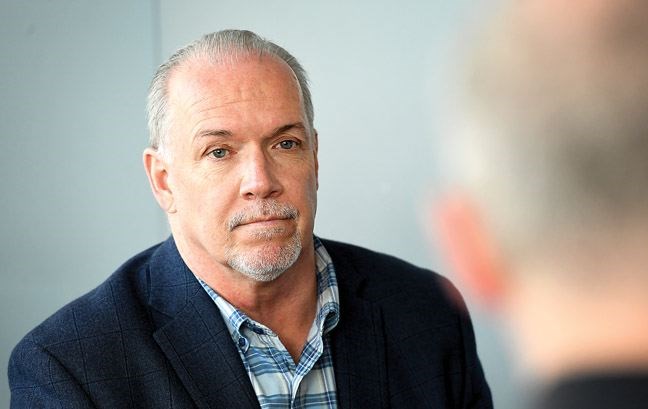B.C.'s New Democratic Party leader John Horgan wants British Columbians to check the calendar and take note of the year.
In this provincial election campaign, as in all campaigns since he last sat on the government side of the house 17 years ago, the governing B.C. Liberals have called attention to the 1990s. The economy was in dire straights and the NDP has worn the blame for it. It is time, said Horgan, to recognize that their ideas are as fresh as modern times.
"I believe Ms. (incumbent premier Christy) Clark keeps going to the well too many times," he said during a visit to The Citizen on Thursday. "This election, like all elections, is about people. Who is going to be fighting for you? What services are you going to provide that aren't being provided right now? Are you going to make life more affordable? MSP premiums, hydro rates, ICBC rates, ferry fares, tuition fees? It's not about the 1990s, it is about right now."
The hottest issue of the moment with British Columbia's fingerprints on it is the current trade impasse with the United States over softwood lumber. The previous deal expired in 2016 and both sides had been operating on the old terms as a new deal was hammered out. However, that deal did not come to the signature table, President Obama was replaced by President Trump, and this week Trump's administration admonished Canada's lumber industry and slapped on punitive border fees for wood crossing into the United States.
Horgan believes Prime Minister Justin Trudeau has done a good job trying to get to a softwood lumber agreement, but thinks Clark has been too soft as B.C.'s main representative.
"I'm not the federal trade minister, I'm hoping to become the premier of B.C., but if I were, Mr. Trudeau had an overlap. And I don't want to be critical of him, because I think he has played both administrations very adeptly to this point in time. There was the bromance with Mr. Obama and that was all good for us, good for Canada-U.S. relations. That would have been the time to strike, I think, on this critically-important issue to British Columbia, I think he handled that very well, but now we have to wait and see what happens with this uncertainty that Mr. Trump brings to bear on trade relationships with the entire universe, much less with Canada. But critical issues to us (that Trump has recently spoken of) are agriculture, forestry and now potentially aluminum might be
in his mind. But I thought
Mr. Trudeau arranged his cabinet with a focus on trade, we have diversified trade, but we need the U.S. and the U.S. needs us."
Clark opted to appoint veteran B.C. business and government figure David Emerson to be B.C.'s full-time trade envoy on the softwood file. Emerson was once the CEO of Canfor, and was a federal minister under prime ministers Paul Martin and Stephen Harper.
He was intrinsically connected to the negotiations that resulted in the last softwood lumber agreement.
"Mr. Emerson is eminently qualified, I have no issue with him," said Horgan, but noted that other Canadian premiers like Rachel Notley and Brad Wall went to Washington themselves to make their voices heard.
"I think we need to up our game on this and I'm going to be standing steadfast with forest workers and forest communities and aggressively push and promote the B.C. position."
He sees a great deal of opportunity to strengthen B.C.-U.S trade, and it would be one of his primary personal agenda items should he become premier, Horgan said. He also wants to continue with the trade to the world going on out of B.C.'s shipping ports. The one exception, said this coastal MLA, is raw logs, the export of which he opposes.
One of the industries he is most optimistic about is the marijuana sector, already B.C.'s biggest export engine - only it is anchored in the black market - pending new federal laws that will legalize and regulate its production.
"It's an underground industry that's coming above ground," Horgan said, and mentioned how he dispatched senior NDP members John Farnworth and Carol James to the U.S. jurisdictions where it was already a legitimate commodity to learn the economics of it.
"I saw this coming, I think the public is well ahead of the policy makers on this question, it is a massive industry, it's just not one that's benefiting the broader public."
Horgan said the NDP has crafted a tax structure for the province that, in his view, is broadly fair to the public, businesses and industry and covers the financial bases his party would address should they form government, like better support of the education system, healthcare system and social infrastructure. He encouraged voters to spend time looking at their platform information on their website.
When compared to the Liberals and B.C. Green Party, he believed voters would prefer the NDP's vision of the future.
Election day is coming on May 9.
The NDP's local candidates are Bobby Deepak (Prince George-Mackenzie) and Natalie Fletcher (Prince George-Valemount).



